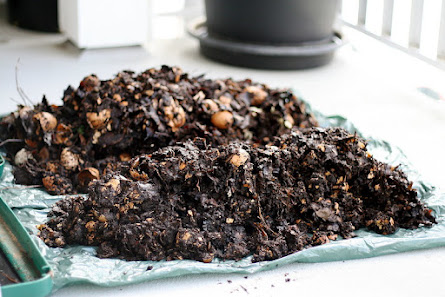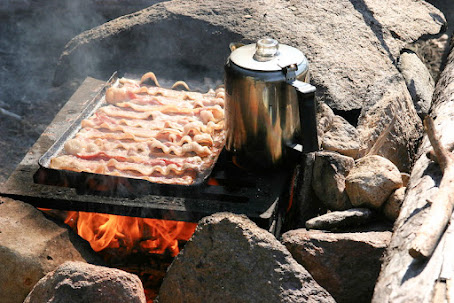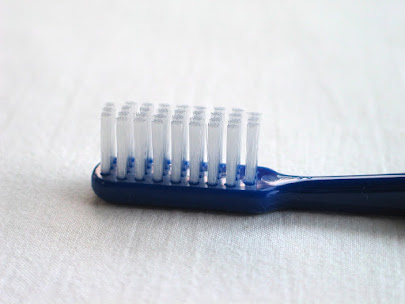To a lot of people, eggshells are trash. But to a homesteader, that "trash" is gold. There are so many ways to use eggshells - and many benefits in doing so. Here are the very best ideas I've run across.
1. Feed Them to Your Chickens
Hens (and other egg-laying poultry) require plenty of calcium to produce eggs with strong shells. Moreover, hens who are low in calcium often develop a serious health condition called prolapsed vent (where their vent - the hole that eggs come out of - literally pushes outside of their body). Often, chicken keepers purchase specially packaged, crushed oyster shells or limestone from feed stores, but eggshells from your own flocks work just as well.
(PLEASE NOTE: I don't recommend using the shells of store-bought chicken eggs for any food-related purposes; factory-farmed hens are often deficient in macro and micro-nutrients and store-bought eggs are washed in bleach or other antimicrobial liquid before they arrive on grocery store shelves.)
You may either immediately feed your hens the shells from eggs you've just cracked, or you may collect egg shells to feed to them later. If doing the latter, it's wise to air dry the shells, then sprinkle them onto a rimmed baking sheet; bake at about 350 degrees F. until the shells are brittle, approximately 10 - 15 minutes. This kills any harmful bacteria that may be present and makes the shells much easier to crush. (If using shells from hard-boiled eggs, you may skip putting the shells in the oven.)
 |
| Dried eggshells are perfect for birds. Courtesy of Ivan Radic. |
When serving your hens eggshells, always crush them. This prevents hens from equating their just-laid eggs with food. (Because yes, chickens and other poultry will sometimes eat their own eggs.) Crushing can be done by hand (I favor putting the shells in a bag and running over them with a rolling pin), or you can run dried eggshells through a coffee grinder, blender, or food processor. (Just be aware that eggshells will scratch plastic food processor/grinder bowls.)
 |
| It's easy to crush eggshells in a food processor. |
It's considered best to offer the eggshells in a separate bowl from your chicken's feed, since this allows hens to self-regulate how much calcium they are eating. Too much calcium can lead to calcium deposits on the outside of eggshells...and eventually will damage a chicken's kidneys.
2. Feed Them to Wild Birds
Just as eggshells provide a boost of nutrition for your chickens, they can do the same for wild birds. Follow the same steps outlined above, and simply mix the crushed shells into wild bird food. If you prefer, you may place the shells on a flat surface outside - such as an empty bird bath - but be aware that this method may attract other wild animals, some of them undesirable (like rodents).
3. Feed Them to Your Dogs
Most dogs adore eggs, shells and all. I offer our dogs small amounts of eggshells immediately after cracking and using eggs. If you want to amass shells for your dogs, follow the same guidelines as you would for chickens. If you powder the dried eggshells, you can add a bit of nutrient-rich powder to their food now and then.

Eggshells can deter slugs, snails, and even cats.
4. Use Them as a Deterrent
Crushed eggshells can keep slugs and snails from destroying your garden. Simply dry them out and crush into small pieces. (Don't powder them and don't leave large pieces behind; in this application, eggshells work because their sharp edges cut - or at least, irritate - slimy pests.) Do note that rain or heavy irrigation will shift the eggshells and perhaps cover some up with soil, making them a less effective deterrent.
Some people also find that the sharp edges of eggshells deter house cats. If, for example, you have a spot in your garden that cats use as a litter box, try putting eggshells in that location.
5. Feed Your Tomatoes
One of the most common issues gardeners have with tomatoes is blossom end rot, which is often caused by the soil not having enough calcium or by the plant being unable to absorb calcium (because of inconsistent watering, for example. Learn more about blossom end rot here.). Therefore, it's always smart to add calcium to the holes you plant tomatoes in.
For best results, use powdered eggshells, which will release their nutrients more quickly than whole or crushed shells.
6. Feed the Soil
Other plants love the nutrients in eggshells, too, so don't hesitate to add them to potting soil, or use them as a general organic amendment in the garden. Just remember that if you want those nutrients to quickly become available to your plants, you should powder the shells first.
Another way to use dried eggshells as a fertilizer is to soak them in a jar of water. Let the mixture sit for at least a week, and when the water is no longer clear, strain out the shells and use the water to irrigate your plants.
 |
| Eggshells are an excellent addition to the compost pin. Courtesy of Lindsay. |
7. Compost Them
Similarly, eggshells make an excellent addition to compost. I usually put them in without crushing them first, but this does mean they take a long time to break down. I often have "finished" compost with still-visible eggshells in it. There's nothing wrong with that, but if you prefer, you may finely crush or powder the eggshells so they decompose faster.
8. Add to Kefir
Eggshells can be used to feed your water kefir grains and add nutrients to your finished product. Just make sure your eggs are well washed - inside and out - before you begin. Use up to one whole shell for a half-gallon of water kefir. Once the first fermentation is completed, the eggshell will be broken down and may even be completely disintegrated.
 |
| Coffee can benefit from eggshells. Courtesy of Robert Engberg. |
9. Add to Coffee
Old-timers used eggshells when making campfire coffee. They crushed the shells and put them directly in the coffee pot to keep the coffee grounds at the bottom, where they wouldn't end up in anyone's cup. If you want to try this at home, make sure you're either boiling your coffee well or using oven-dried shells, to prevent unwanted bacteria that could make you sick.
Another way eggshells are used when making coffee is to mellow out a brew and make it less acidic. For example, if you over-brew your coffee, add crushed eggshell, then strain; the flavor of the coffee will be improved. As a guideline, use a single eggshell for every 4-cup pot.
10. Add to Broth or Stock
Some people swear by adding eggshells to their homemade stock or broth - which makes some sense, when you think about it. After all, seafood shells are frequently used to make fish stock. Certainly, shells add some great micro-nutrients to the liquid, including calcium, magnesium, selenium, zinc, and phosphorus. Just add the shells to the pot when you add bones and vegetables, then strain them out when the mixture is done simmering.
11. Clean Cast Iron or Stainless Steel
If you cook with cast iron, you've likely heard of using salt to scrub out stubborn food from your pans. But did you know you can use eggshells for the same purpose? Crush the shells a bit first. They will break down as you rub, but then can be rinsed away easily. This trick works well for stainless sinks, too.
12. Make Chalk
Have your kids help you make fun sidewalk chalk by drying some eggshells and then finely grinding them. Stir together 3 tablespoons of ground eggshells with 1 tablespoon of warm or hot water, 1 tablespoon all-purpose flour, and, if desired, a bit of food coloring. Pour this mixture into an empty toilet paper tube placed on a rimmed baking sheet - or simply shape the dough-like mixture into the shape you desire. Allow it to fully dry, then remove the tube and have fun with your homemade chalk!
 |
| Finely crushed eggshells are an old-timey tooth powder. Courtesy of Jonas Bergsten. |
13. Make Tooth Powder
Many years ago, eggshells were used to clean teeth. According to some modern natural health gurus, brushing with eggshells can even improve tooth enamel. Use oven-dried eggshells (or the shells from hardboiled eggs) and grind them into a powder first. Some people like to add the ground shells to coconut oil to make brushing easier. Personally, I would consult my dentist before trying this old-timey trick.











No comments